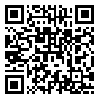Volume 13, Issue 2 (Summer 2018)
jmed 2018, 13(2): 114-139 |
Back to browse issues page
Download citation:
BibTeX | RIS | EndNote | Medlars | ProCite | Reference Manager | RefWorks
Send citation to:



BibTeX | RIS | EndNote | Medlars | ProCite | Reference Manager | RefWorks
Send citation to:
akbari Z. The Need to Develop and Incorporate the Soft Skills (General) Courses into the Educational Curriculum of Medical Sciences' students
. jmed 2018; 13 (2) :114-139
URL: http://jmed.ssu.ac.ir/article-1-810-en.html
URL: http://jmed.ssu.ac.ir/article-1-810-en.html
Assistant Professor, Isfahan University of Medical Sciences, Isfahan, Iran , akbari@mng.mui.ac.ir
Abstract: (8600 Views)
Introduction: The study of the current educational status of the Iranian universities and higher education system reveals that higher education does not incorporate the most essential soft skills required by the learners. The educational curriculum must reorganize these skills to improve learners’ educational and professional competence in general skills in parallel with academic and specific skills. This study aims to provide a framework for the basic soft skills courses university students are required to cover during their academic education in medical universities
Methods: It was a qualitative study in which 57 MSc students of midwifery (14), nursing (35) and operating room (8) and 12 academic members in these fields of study (4) in each field) in Isfahan University of Medical Sciences were selected purposefully as they were the only available participants and volunteer lecturers in 1395-96. All of the students were working in clinical centers three days in a week. The students’ behaviors as far as their academic and occupational needs, expectations and general skills together with their academic skills were observed by the researcher. At the same time, their occupational and research behaviors, expectations, needs and skills in academic and clinical contexts were observed by their experienced content teachers. Individual and focus-group semi-structured interviews with the students and individual interviews with their content teachers, observations and field notes were used to achieve a comprehensive view of the skills required for work and education which implicitly incorporate the skills for having a healthy life. Data collection was continued until the point of saturation is reached. The interviews were recorded and transcribed with the participants’ consent. The primary themes and sub-themes were extracted through thematic analysis. To ensure consistency and accuracy of data, credibility, transferability, dependability and conformability criteria were assessed.
Result: In this study, through data analysis, six main categories together with their subcategories were extracted from the data. The results revealed that they had various educational expectations and needs as far as soft skills are concerned. These skills were as follows: individual, spiritual, hygienic, educational-academic, occupational and communicative.
Conclusion: The findings indicated that students are urgently required to be equipped with soft skills to enhance the quality of their individual, academic, occupational and social life. However, these skills have been neglected throughout their academic education. Therefore, their traditional educational curriculum needs to be revisited and modified in order to train productive graduates. To achieve this goal, integrated constant collaboration and consultation of different groups such as university students, graduates, employees, employers, academic members, parents and policy makers in ministry of education and higher education are required.
Keywords: professional competence, health education, allied health personnel, schools, medical, Isfahan University of Medical Sciences, qualitative research.
Methods: It was a qualitative study in which 57 MSc students of midwifery (14), nursing (35) and operating room (8) and 12 academic members in these fields of study (4) in each field) in Isfahan University of Medical Sciences were selected purposefully as they were the only available participants and volunteer lecturers in 1395-96. All of the students were working in clinical centers three days in a week. The students’ behaviors as far as their academic and occupational needs, expectations and general skills together with their academic skills were observed by the researcher. At the same time, their occupational and research behaviors, expectations, needs and skills in academic and clinical contexts were observed by their experienced content teachers. Individual and focus-group semi-structured interviews with the students and individual interviews with their content teachers, observations and field notes were used to achieve a comprehensive view of the skills required for work and education which implicitly incorporate the skills for having a healthy life. Data collection was continued until the point of saturation is reached. The interviews were recorded and transcribed with the participants’ consent. The primary themes and sub-themes were extracted through thematic analysis. To ensure consistency and accuracy of data, credibility, transferability, dependability and conformability criteria were assessed.
Result: In this study, through data analysis, six main categories together with their subcategories were extracted from the data. The results revealed that they had various educational expectations and needs as far as soft skills are concerned. These skills were as follows: individual, spiritual, hygienic, educational-academic, occupational and communicative.
Conclusion: The findings indicated that students are urgently required to be equipped with soft skills to enhance the quality of their individual, academic, occupational and social life. However, these skills have been neglected throughout their academic education. Therefore, their traditional educational curriculum needs to be revisited and modified in order to train productive graduates. To achieve this goal, integrated constant collaboration and consultation of different groups such as university students, graduates, employees, employers, academic members, parents and policy makers in ministry of education and higher education are required.
Keywords: professional competence, health education, allied health personnel, schools, medical, Isfahan University of Medical Sciences, qualitative research.
Keywords: professional competence, health education, allied health personnel, schools, medical, Isfahan University of Medical Sciences, qualitative research.
Type of Study: Research |
Subject:
Medical Education
Received: 2017/07/22 | Accepted: 2018/01/27 | Published: 2018/08/15
Received: 2017/07/22 | Accepted: 2018/01/27 | Published: 2018/08/15
Send email to the article author
| Rights and permissions | |
 |
This work is licensed under a Creative Commons Attribution-NonCommercial 4.0 International License. |





